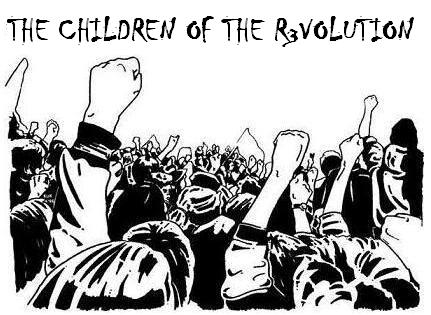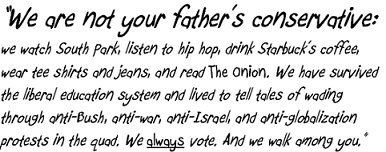
Stanley Bing posted a pragmatic defense of an auto bailout. With his usual sardonic manner, he admits that the auto industry is broken, unions are part of the problem, and handouts are not good precedent. But, he says, "I don't care if we're investing in a broken-down model or helping people who make more money than you think they should. I like the idea of several hundred thousand people staying on the job, paying their mortgages, buying flat-screen TVs, shoes and hamburgers." Now I usually like Bing - but he's so wrong here I have to call him out.
Bing also points to increased spending on advertising, and money going to suppliers for production of new vehicles. He argues the trickle-up model that is so popular among bailout advocates. The plan is straightforward enough: bailout the workers and their industry....???....profit (or at least recover)! Here's the problem with his underpants gnome economics:
The question mark in this equation reflects how that money gets spent, and how worker-oriented bailouts condition demand in the market. A lot of intelligent people are arguing for and against the bailout, most of them with immeasurably more technical understanding than myself. Stanley points out that they don't know any more than him about the current economy. I'd tend to agree, but while he uses that as an excuse for unwise policy to "stabilize the patient" as the Obamessiah put it, I see things differently.
The current market bubble was caused on a technical level by over-leveraged lenders selling toxic securities to investors with an ignorance-is-bliss attitude. But on a practical level, the market bubble inflated, and subsequently popped, because of inflated consumer demand for easy credit - not stock brokers and quant financial gurus, but because of the very people Bing is saying will prop up the system if they can only be permitted to keep their jobs.
It all broke from the bottom, so fix it from the bottom?
Yes, but not how he thinks. It broke from the bottom, so the bottom will need to adjust most to get things right. Unfair? Maybe in a holistic sense, but I think in the long-run its alot more fair to force the American consumer to adjust, than to feed their avarice by redistributing money and then telling the people at the top to play nicer.
The SUVs, flat-screen TVs, hamburgers - all the stuff Bing wants to see being consumed more (to keep the bubble at least a bit inflated, you see), are the problem. How many Americans spent themselves into oblivion - too much house, too much television, too much car. Obviously a lot, judging by the rate of credit default that's driving this crisis.
There's a lot of good, sound economic reasoning that points to keeping the ship afloat - heck, the term "bailout" comes from the idea of helping to bail water out of a sinking ship. Problem is, in the process we're tearing down one part of the hull to patch another. The economy can't recover for real until we abandon ship, swim back to shore, and build a better boat. That might mean alot of people drown along the way, and the captain probably won't go down with his ship like he should, but that's reality folks.
Hindsight, of course, is always 20/20, and it's easy for pundits and politicians to claim victory regardless of the actual results of policy by retrospectively changing the standards of success. However, I think everybody knows deep-down that the only real solution is inflicting enough (economic) pain on the average consumer that they change their ways. Yes, repair will come from the bottom-up; but just as the crisis was consumer-driven, the change will have to be as well.
Bing also points to increased spending on advertising, and money going to suppliers for production of new vehicles. He argues the trickle-up model that is so popular among bailout advocates. The plan is straightforward enough: bailout the workers and their industry....???....profit (or at least recover)! Here's the problem with his underpants gnome economics:
The question mark in this equation reflects how that money gets spent, and how worker-oriented bailouts condition demand in the market. A lot of intelligent people are arguing for and against the bailout, most of them with immeasurably more technical understanding than myself. Stanley points out that they don't know any more than him about the current economy. I'd tend to agree, but while he uses that as an excuse for unwise policy to "stabilize the patient" as the Obamessiah put it, I see things differently.
The current market bubble was caused on a technical level by over-leveraged lenders selling toxic securities to investors with an ignorance-is-bliss attitude. But on a practical level, the market bubble inflated, and subsequently popped, because of inflated consumer demand for easy credit - not stock brokers and quant financial gurus, but because of the very people Bing is saying will prop up the system if they can only be permitted to keep their jobs.
It all broke from the bottom, so fix it from the bottom?
Yes, but not how he thinks. It broke from the bottom, so the bottom will need to adjust most to get things right. Unfair? Maybe in a holistic sense, but I think in the long-run its alot more fair to force the American consumer to adjust, than to feed their avarice by redistributing money and then telling the people at the top to play nicer.
The SUVs, flat-screen TVs, hamburgers - all the stuff Bing wants to see being consumed more (to keep the bubble at least a bit inflated, you see), are the problem. How many Americans spent themselves into oblivion - too much house, too much television, too much car. Obviously a lot, judging by the rate of credit default that's driving this crisis.
There's a lot of good, sound economic reasoning that points to keeping the ship afloat - heck, the term "bailout" comes from the idea of helping to bail water out of a sinking ship. Problem is, in the process we're tearing down one part of the hull to patch another. The economy can't recover for real until we abandon ship, swim back to shore, and build a better boat. That might mean alot of people drown along the way, and the captain probably won't go down with his ship like he should, but that's reality folks.
Hindsight, of course, is always 20/20, and it's easy for pundits and politicians to claim victory regardless of the actual results of policy by retrospectively changing the standards of success. However, I think everybody knows deep-down that the only real solution is inflicting enough (economic) pain on the average consumer that they change their ways. Yes, repair will come from the bottom-up; but just as the crisis was consumer-driven, the change will have to be as well.







No comments:
Post a Comment